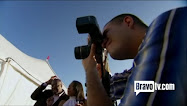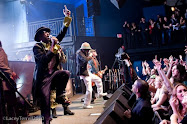 WASHINGTON POST EXPRESS
WASHINGTON POST EXPRESS WEEKEND PASS COVER STORY
ARTS & EVENTS
Haunted Hill: When Hip-Hop Party Band Cypress Hill Performs Live, It Sure Does Light Up a Joint
Written by Washington Post Express contributor Alfredo Flores
CYPRESS HILL WOULD regularly perform on Halloween at the 9:30 Club. And why not? If the haunted holiday ever had its own theme song, Cypress' Sen Dog thinks it should be the band's 1993' mega-hit, "Insane in the Brain." "That should be played all day on Halloween," said Sen. "C'mon. It's the one day you can dress up and act like a freak if you want." The band is best known for its slow-rolling drum-and-bass loops and funky-stark grooves that have an eerily stoned feel. Cypress uses spooky effects, such as the sound of pouring raindrops, which go well with the band's gloomy album titles — "Black Sunday," "Temples of Boom," "Skull & Bones" — and their talk of paranoia, insanity, fearing the reaper, etc. And while dark themes rule on Halloween, Cypress Hill can also rock hard on tracks featuring high-energy, rapid-fire rock riffs. Cypress Hill is notorious for its live shows — stunts such as having a gigantic inflated Buddha doll as a stage prop and the band's percussionist Eric Bobo smoking out of an 8-foot-tall bong (dubbed King Arthur). Its lyrics deal with parodied versions of the violent street life of Cypress Avenue in South Gate, East Los Angeles, and, of course, the trio's obsessive advocacy for legalizing marijuana. Their vocals are just as eccentric with lead lyricist B-Real's (Louis Freese) exaggeratedly nasal high-pitched whine, and Sen's (Senen Reyes) mostly shouting his equally exaggerated deep booming "psycho beta tone" raps. The genesis of the polar opposite vocals came when the two were working on a demo. While the band's style and beats were well received, some weren't thrilled with B-Real's normal voice. "My voice didn't cut through the music like it should; it sounded average, nothing distinct about it," said B-Real. "I was asked to change it up, so I locked into that nasal vocal tone and Sen created the '
 whoo-whoo' deep tones to complement mine. It was kinda like Public Enemy, but inside out." Indeed. Public Enemy's lead vocals come from the deep-voiced and physically imposing Chuck D, while Flava Flav sports giant sunglasses and a clock, and serves as comic foil. With Cypress, despite his high-pitched vocals, B-Real serves as the aggressor backing up the violent themes. "That's the dark humor about it," said B-Real, laughing. "I sound like a squirt trying to talk big. I think people trip out of it, because you have this crazy-ass voice talking some crazy-ass stuff. I think it was [an expletive] for people, but in a good way." Cypress' self-titled debut 1991 album had the bass-heavy, violent-filled "Hand on the Pump" and "How I Could Just Kill a Man," but it was the track "Hole in the Head" that featured the verse that would later become the chorus for "Insane." DJ Muggs (Lawrence Muggerud), whose production work was instrumental to the band's success, found inspiration in the title phrase and came up with the track's hypnotic beat. "When I heard Muggs' beat, I was like, 'Wow, this stuff is crazy,'" said B-Real. "It's like a magnet, a bounce — you go to the show and we could just picture everybody jumping, mosh-pitting, stage-diving." And that's just what the fans did, transcending Cypress Hill from buzz-worthy rappers to breakout superstars with the track and critically claimed 1993 album "Black Sunday." The album was loaded with odes to ganja and sprinkled with rock elements, initiating a strong following among rock audiences. "The imagery of our work has always been dark and mysterious like metal albums, and our attitude was real non-give-[an expletive]-ish like punk rock," said B-Real. "Our music was hip-hop at the base, though. After Run-DMC, we were the band in the forefront of making the hip-hop and metal connection." The trio's work in the hip-hop world alone has earn
whoo-whoo' deep tones to complement mine. It was kinda like Public Enemy, but inside out." Indeed. Public Enemy's lead vocals come from the deep-voiced and physically imposing Chuck D, while Flava Flav sports giant sunglasses and a clock, and serves as comic foil. With Cypress, despite his high-pitched vocals, B-Real serves as the aggressor backing up the violent themes. "That's the dark humor about it," said B-Real, laughing. "I sound like a squirt trying to talk big. I think people trip out of it, because you have this crazy-ass voice talking some crazy-ass stuff. I think it was [an expletive] for people, but in a good way." Cypress' self-titled debut 1991 album had the bass-heavy, violent-filled "Hand on the Pump" and "How I Could Just Kill a Man," but it was the track "Hole in the Head" that featured the verse that would later become the chorus for "Insane." DJ Muggs (Lawrence Muggerud), whose production work was instrumental to the band's success, found inspiration in the title phrase and came up with the track's hypnotic beat. "When I heard Muggs' beat, I was like, 'Wow, this stuff is crazy,'" said B-Real. "It's like a magnet, a bounce — you go to the show and we could just picture everybody jumping, mosh-pitting, stage-diving." And that's just what the fans did, transcending Cypress Hill from buzz-worthy rappers to breakout superstars with the track and critically claimed 1993 album "Black Sunday." The album was loaded with odes to ganja and sprinkled with rock elements, initiating a strong following among rock audiences. "The imagery of our work has always been dark and mysterious like metal albums, and our attitude was real non-give-[an expletive]-ish like punk rock," said B-Real. "Our music was hip-hop at the base, though. After Run-DMC, we were the band in the forefront of making the hip-hop and metal connection." The trio's work in the hip-hop world alone has earn ed them the VH1 Hip-Hop Honors in 2008, the first for a Latin rap group. They've also become the first Latin rap group to have platinum and multi-platinum albums. "At the end of the day, we want to leave a strong legacy, and people can say Cypress was a kick-ass band," said Sen. Like its 2000 hit "(Rock) Superstar," the band continues to tour and party like rock stars, and its new album, "Rise Up" — the first in five years — is set to be released shortly. But after having sold more than 20 million records and approaching 20 years in the game, a rarity in hip-hop, how much longer can Cypress go? "People used to call us the Grateful Dead of hip-hop," said B-Real. "In about 10 years, they're going to call us the Rolling Stones of hip-hop." » 9:30 Club, 815 V St. NW; with Tabi Bonney, Phil Ade, Sat., Oct. 31, 8 p.m., $35; 800-955-5566. (U St.-Cardozo)
ed them the VH1 Hip-Hop Honors in 2008, the first for a Latin rap group. They've also become the first Latin rap group to have platinum and multi-platinum albums. "At the end of the day, we want to leave a strong legacy, and people can say Cypress was a kick-ass band," said Sen. Like its 2000 hit "(Rock) Superstar," the band continues to tour and party like rock stars, and its new album, "Rise Up" — the first in five years — is set to be released shortly. But after having sold more than 20 million records and approaching 20 years in the game, a rarity in hip-hop, how much longer can Cypress go? "People used to call us the Grateful Dead of hip-hop," said B-Real. "In about 10 years, they're going to call us the Rolling Stones of hip-hop." » 9:30 Club, 815 V St. NW; with Tabi Bonney, Phil Ade, Sat., Oct. 31, 8 p.m., $35; 800-955-5566. (U St.-Cardozo)





























